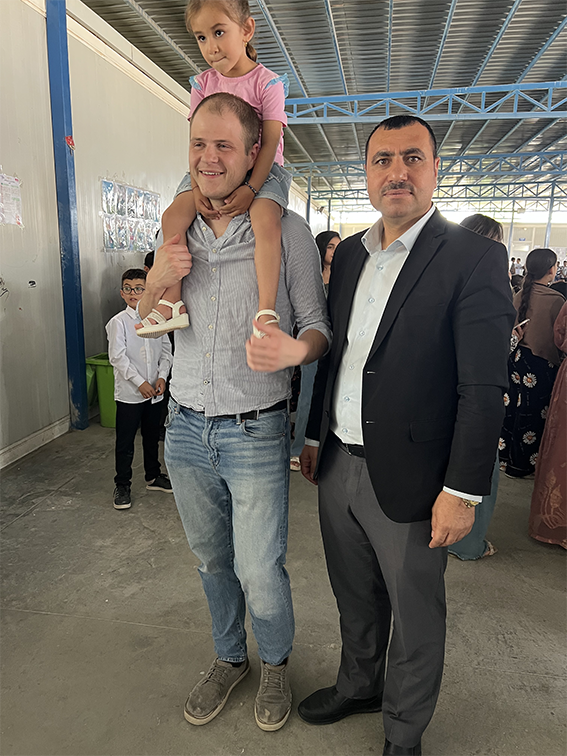By day three in northern Iraq, the landscape begins to repeat. Tent camps, half-built homes, and roads baking in the sun. On the way to the school, you start to recognize the rebar poking out of the same crumbling balconies.
The school is large. In the courtyard, clusters of uniformed children chase each other through the sand. Inside, ten teachers gather in a room to tell us what we already suspect: the classrooms are overcrowded and underfunded. There are 640 students and only 9 paid teachers. Seven more volunteer their time without a paycheck.
In the next room, a government representative overseeing education in the region sits behind an ornate wooden desk adorned with gold pens and national flags. The meeting ends before it begins, and she stands to leave. Our translator, Shahab, offers his hand. She declines. “Thank you for coming. You are welcome,” she says, then disappears down the hallway.
Showing up
The principal stays. He tells us about the broken air conditioners, the broken solar panel that used to power the lights, the classrooms that go dark in winter. Still, he calls this the best school in Shariya, and parents are proud that their kids attend school here. You wonder, If this is the best, what does the worst one look like?
But over the next hour, you see what he means. Teachers, some paid, some not, cramming 60 students into sweltering rooms and teaching anyway. Showing up every day not for a paycheck, but for the kids. They believe in the work. That belief fills the cracked walls with something like hope.
As we leave, we’re invited to the end-of-year certificate ceremony. It’s the last day before summer break. The children swarm around the camera, eager to be seen, captured, remembered. That’s when you get a real sense of what 640-to-17 actually means, a sea of joyful chaos with a handful of adults doing their best to guide it.
God forgive me
On the way home, Shahab turns to you. “Did you notice she wouldn’t shake our hands?” He doesn’t sound angry; he just sounds tired. “She’s Muslim. They see Yazidis as unbelievers and often refuse to drink our tea or eat our food. Some even whisper ‘God forgive me’ before interacting with us.” He continues. “In Mosul, some schools have 17 teachers and 24 students. They’re well-maintained. The government listens to their needs.”
You stare out the window as the tent camps roll past again. The realization settles in: that woman, the one who refused even basic gestures of human respect, is the representative tasked with advocating for this community. She’s the one federal Iraq asks about what the schools in Shariya need.
You didn’t fix the school. You didn’t replace the solar panel or fund the salaries. The broken system remains. But the people inside it, the teachers, the principal, the volunteers, keep showing up. Teaching in the heat. Organizing children. Hoping the next generation has more options than they did.
For now, that hope is holding everything together.
Jon Peerbolt is our USA team leader and has worked with Novi for almost four years. He lives in Grand Rapids, Michigan. His reflections are from his trip to visit one of Novi's projects in Kurdistan this year.
